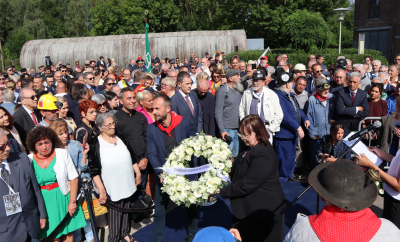The “ethos of exploitation” which caused one of Europe’s most notorious industrial disasters is still leading to the deaths and injuries of migrant workers almost seven decades later, the General Secretary of the European Trade Union Confederation (ETUC) warned today.
Esther Lynch attended an event to commemorate the 67th anniversary of the Marcinelle mining disaster, in which more than half of the 262 victims were migrant workers from Italy who worked and lived in appalling conditions as part of a deal between the two countries for cheap coal.
On this day in 1956, 262 miners lost their lives in the Marcinelle disaster caused by an ethos of exploitation
— EUROPEAN TRADE UNIONS (@etuc_ces) August 8, 2024
We remember the workers who died and rededicate ourselves to the fight for safe working conditions for all pic.twitter.com/hmjb2imy0a
Speaking at the event, Lynch said the conditions would today be considered ‘modern slavery’:
“The reality for those migrant workers arriving in Belgium and working in the mines was misery and exploitation. Working six days a week for more than eight hours a day without most basic health and safety protections.
“Frequent accidents at work and terrible occupational diseases caused by the mine dust, silicosis also cut workers lives short. The exploitation was made worse by the impossibility for workers to look for better employment, because the contract obliged them to work at least a year in the mines, under penalty of arrest.
“And, at the end of every back breaking day of work, they faced terrible living conditions, often in barracks or hangars without most basic services. Finding rental accommodation was in fact almost impossible for them at the time. On the doors of the apartments on rent you could often find the message: ‘neither animals nor foreigners’. It was what we call ‘modern slavery’.”
Migrant workers still at highest risk
While trade unions won many improvements in health and safety in the wake of the Marcinelle disaster, continued exploitation faced by workers shows Europe has still not fully learned the right lessons.
Around 3,500 people still lose their lives at work every year while almost three million suffer accidents, according to EU statistics. Italy has the second highest number of workplace fatalities.
Migrant workers are at particular risk due to the precarious conditions in which they are often forced to work:
In June, the dangerous conditions faced by migrants working on farms across Europe were tragically illustrated when a man was killed in Italy after a machine severed his arm.
There has been a recent spike in deaths in the construction industry and many of the victims were migrant workers who are more vulnerable to exploitation through subcontracting.
There has been a significant increase in the number of people dying after being forced to work in extreme heat and research shows migrant workers are at the highest risk due to the precarious conditions they are forced to work under.
Migrant workers, including those from Italy, were also denied proper wages, food and accommodation while working on the Rive Gauche shopping centre in Charleroi, just a few kilometres from Marcinelle.
The ETUC is calling for the new European Commission to prevent these scandals by limiting subcontracting, introducing safe maximum working temperatures, ensuring member states invest in labour inspectors, regularising migrant workers, and giving public contracts only to companies which respect trade union and workers’ rights.
Addressing the need to learn the lessons from the Marcinelle tragedy, Lynch added:
“Today we rededicate ourselves to continuing that struggle because working people and migrant workers in Europe still face exploitation and misery, still they are discriminated against and still they are forced to live in terrible accommodation.
“We have seen this year countless deaths and injuries caused by work across Europe. In these days, working under the summer heat, workers become ill and die because of conditions at work.
“Tragedies created by the same ethos of exploitation, the same lack of respect for health and safety rules, unregulated subcontracting, exploitation of migrant workers, undeclared work. Tragedies, deaths and injuries that could have been and should have been avoided.
“For this reason, remembering the tragedy of Marcinelle is so important. Because the tragedy of Marcinelle, and the trade union, social and political mobilisation that followed, still indicate the road that the European Union must pursue: A road of solidarity, equality and fairness.”


